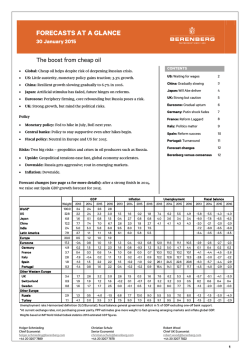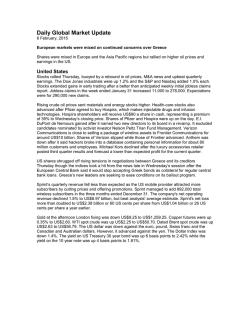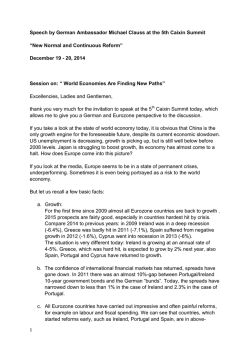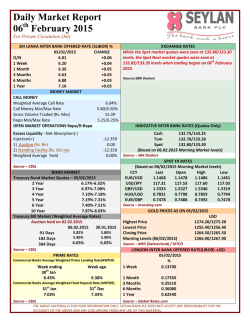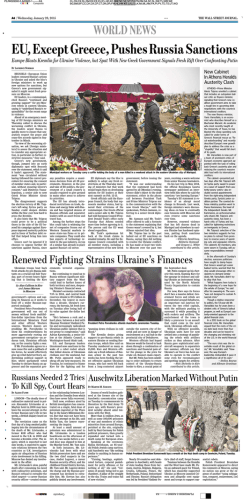
Economics Greece: towards a skewed deal?
Economics Greece: towards a skewed deal? ʀ Good news: Greece has moved. While Athens still has to offer more to its creditors by the new deadline of Wednesday evening, both sides apparently see the proposals Greece presented on Monday morning as a basis for a potential deal. ʀ Bad news: Greece is putting forward the wrong kind of deal. Within the overall sustainability parameters set by creditors, Athens proposes almost exclusively tax hikes rather than pro-growth structural reforms and well targeted expenditure cuts. This would repeat the key mistake of the early 2010-2013 bailout programmes for Greece, namely to hit aggregate demand too hard instead of raising supply fast. ʀ A bad deal would still be vastly better than no deal at all. It would avoid a Greek default and the Grexit abyss. It would eventually allow Greece to emerge from the Tsipras recession into which the new government has pushed the country. ʀ But it would still be a badly skewed deal, unnecessarily prolonging the misery in Greece, restraining the future pace of growth, retarding the recovery in the labour market and adding to the risks to be borne by creditors relative to a good deal. It would prevent the Greek economy from bouncing back up as vigorously as Spain. ʀ The saga is not over yet. Even if there is a deal now, negotiations about a followup bailout programme would probably remain contentious. The regular reviews of the deal could once again reveal that the Greek side may not be able or willing to fully implement all measures. Expect the Greek noise to recur. But a deal now would set a precedent that Europe can tame even a left-wing firebrand such as Tsipras. If Tsipras and Europe now take the first big hurdle, they will probably find it less difficult to take the next hurdles without having to go through a near-death experience first. ʀ Whether or not there will be a deal in the next few days remains unclear. The IMF, whose support is needed to get a deal ratified by the German Bundestag, has reacted more coolly to the Greek proposals than the European Commission. But chances for a deal by the end of this week have now risen well beyond the 35% that seemed likely last week. Among the issues to be discussed is whether Greece can find ways to limit the recessionary impact of the tax hikes it is now proposing. ʀ What if? In the last few months, we have discussed repeatedly what would happen in case of a Greek default. With the new Greek proposal, it is now time to discuss in broad strokes what may happen if there actually is a deal roughly along the lines that were reportedly discussed at the Eurozone summit yesterday. Judging by media reports about the contents of the Greek ideas, the proposals demonstrate once again the economic incompetence of the coalition of the radical left, to give Syriza its full length name. Having already pushed Greece back into a cyclical recession, Syriza may now reduce the long-term growth potential of the country. As was the case under the Pasok led-government in 2010-2012, policy makers from the left apparently find it easier to raise taxes than to cut the privileges of trade unions or other special interest groups that make the economy inflexible and restrain supply. Some 93% of the measures Greece is proposing consist of tax hikes, including a shortterm special 12% levy on many business profits followed by a rise in the corporate tax rate from 26% to 29% in 2016. In the pension system, Greece wants to abolish early retirement schemes and raise the retirement age only slowly, reaching 67 years only by 2025. Instead, it wants to plug much of the glaring gap in its pension systems by increasing contributions from workers and companies into the major pension system. Raising the effective retirement age would have added to the supply of labour and hence Greece’s growth potential. Higher contributions would reduce aggregate demand and make it more expensive to employ workers in a double whammy to the outlook for Greek employment. That is not the best way to do it, to put it mildly. Dr Holger Schmieding Chief Economist +44 20 3207 7889 [email protected] Key Macro Views reports Understanding Germany – a last golden decade ahead 13 October 2010 Euro crisis: the role of the ECB 29 July 2011 Saving the euro: the case for an ECB yield cap 26 June 2012 Tough love: the true nature of the euro crisis 20 August 2012 Mind the court: the top event risk in Europe 31 May 2013 Europe 2020: Reaping the rewards of reform 26 November 2013 The lessons of the crisis: what Europe needs 27 June 2014 ECB: question is not if, but when and what? 2 December 2014 Euro Plus Monitor 2014: from pain to gain 18 December 2014 Global Outlook 2015: oil, Putin and Greece 6 January 2015 Greek election: election : the reality shock ahead 26 January 2015 23 June 2015 Economics Serious risks remain No deal has been struck yet. It is quite possible that creditors, in fine-tuning the Greek proposals, find ways to lessen their recessionary impact. Also, we do not know to which extent the fine print of a deal would include measures to deregulate product and services markets and to streamline bureaucratic procedures. The more of that Greece could implement fast, the more this could mitigate the hit from higher taxes and contributions to the pension system. Political risks remain: Greek Prime Minister Tsipras may struggle to get a deal ratified by his parliament, with many of his left-wingers already voicing their opposition and with his radical right coalition partner deeply unhappy about the projected €200mn cuts to military expenditure next year. After all, the leader of the radical right seems to enjoy parading tanks and other weapons as part of his job as defence minister. We would expect the major pro-European opposition parties (especially To Potami but also new Democracy and Pasok) to help pass the deal through parliament if need be. But some political upheaval in Athens is quite possible. We cannot rule out that Tsipras may have to change his coalition partner and/or shed Syriza’s left wing to then build a new coalition with some pro-European parties, potentially in return for a promise of early elections some time next year. On the side of creditors, the major player to watch is the International Monetary Fund. A deal needs the seal of approval from the IMF. If the IMF can endorse an accord, German chancellor Merkel would get the deal through the two houses of the German parliament without major problems, despite some opposition from within her own CDU/CSU party. Potential timeline: If creditors and Greece indeed agree a deal within the next 36 hours so that the Eurogroup of finance minister can sign it off on Wednesday evening, followed by approval at the top level at the margins of the regular EU summit starting Thursday, Greece would have to ratify the deal and pass major provisions into law over the weekend. Such Greek “prior actions” would be followed by ratification early next week across the Eurozone, including the vote in the German Bundestag. Whether or not that could be concluded in time for money to be disbursed by 30 June so that Greece can repay the €1.55bn due to the IMF that day is not fully clear. But a gap of a few days could easily be bridged, be it by the IMF showing a little patience or – less likely - by the ECB temporarily lifting the ceiling for Greek short-term bills a little so that Greece can raise the money. Debt relief? This remains the perennial red herring. The net present value of Greece’s public debt has already been cut by more than 40% through the “private sector involvement” of 2011-2013 and, more importantly, through the lengthening of maturities, a 10-year grace period and the cut in interest rates on the European loans to Greece. Servicing its debt to Europe places no serious burden on Greece for the foreseeable future. As discussed repeatedly, Europe has long held out the carrot of even longer maturities and lower interest rates for some of these loans if Greece lives up to its commitment. But the current deal, formally an extension of the second bailout programme for Greece, first needs to be struck, passed and implemented. If Greece then lives up to its obligations afterwards, debt relief as outlined above will be on the agenda, in line with an even further increase in EU spending on infrastructure and other projects in Greece. Economic impact: The current uncertainty about Greece is probably weighing modestly on business confidence and investment in the Eurozone, especially in export-oriented Germany which tends to react more than many other countries to news about crises abroad. If a Greek deal is struck, that small negative effect would likely start to fade from July onwards. Whether or not that happens depends less on the quality of the deal but on a lessening of the deafening noise from Greece. Let’s hope that there is a deal – and let’s hope that in finalising and implementing the deal, the regrettable recessionary elements of what the Greek radicals are now proposing are still somewhat tempered by some measures to raise the supply potential of Greece. 2 Economics Disclaimer This document was compiled by the above mentioned authors of the economics department of Joh. Berenberg, Gossler & Co. KG (hereinafter referred to as “the Bank”). The Bank has made any effort to carefully research and process all information. The information has been obtained from sources which we believe to be reliable such as, for example, Thomson Reuters, Bloomberg and the relevant specialised press. However, we do not assume liability for the correctness and completeness of all information given. The provided information has not been checked by a third party, especially an independent auditing firm. We explicitly point to the stated date of preparation. The information given can become incorrect due to passage of time and/or as a result of legal, political, economic or other changes. We do not assume responsibility to indicate such changes and/or to publish an updated document. The forecasts contained in this document or other statements on rates of return, capital gains or other accession are the personal opinion of the author and we do not assume liability for the realisation of these. This document is only for information purposes. It does not constitute a financial analysis within the meaning of § 34b or § 31 Subs. 2 of the German Securities Trading Act (Wertpapierhandelsgesetz), no investment advice or recommendation to buy financial instruments. It does not replace consulting regarding legal, tax or financial matters. Remarks regarding foreign investors The preparation of this document is subject to regulation by German law. The distribution of this document in other jurisdictions may be restricted by law, and persons, into whose possession this document comes, should inform themselves about, and observe, any such restrictions. United Kingdom This document is meant exclusively for institutional investors and market professionals, but not for private customers. It is not for distribution to or the use of private investors or private customers. United States of America This document has been prepared exclusively by Joh. Berenberg, Gossler & Co. KG. Although Berenberg Capital Markets LLC, an affiliate of the Bank and registered US broker-dealer, distributes this document to certain customers, Berenberg Capital Markets LLC does not provide input into its contents, nor does this document constitute research of Berenberg Capital Markets LLC. In addition, this document is meant exclusively for institutional investors and market professionals, but not for private customers. It is not for distribution to or the use of private investors or private customers. This document is classified as objective for the purposes of FINRA rules. Please contact Berenberg Capital Markets LLC (+1 617.292.8200), if you require additional information. Copyright The Bank reserves all the rights in this document. No part of the document or its content may be rewritten, copied, photocopied or duplicated in any form by any means or redistributed without the Bank’s prior written consent. © June 2015 Joh. Berenberg, Gossler & Co. KG 3 Contacts: Investment Banking www.berenberg.com e-mail: [email protected] / e-mail US: [email protected] EQUITY RESEARCH Internet www.berenberg.com RESEARCH AEROSPACE & DEFENCE Andrew Gollan +44 20 3207 7891 Charlotte Keyworth +44 20 3753 3013 Tom O'Donnell +44 20 3465 2668 CHEMICALS John Klein Evgenia Molotova +44 20 3207 7930 +44 20 3465 2664 HOUSEHOLD & PERSONAL CARE Bassel Choughari +44 20 3465 2675 James Targett +44 20 3207 7873 AUTOMOTIVES Adam Hull Paul Kratz CONSTRUCTION Lush Mahendrarajah Chris Moore Robert Muir Michael Watts +44 20 3207 7896 +44 20 3465 2737 +44 20 3207 7860 +44 20 3207 7928 INSURANCE Peter Eliot Iain Pearce Matthew Preston Sami Taipalus +44 20 3207 7880 +44 20 3465 2665 +44 20 3207 7913 +44 20 3207 7866 LUXURY GOODS Bassel Choughari Zuzanna Pusz +44 20 3465 2675 +44 20 3207 7812 MEDIA Robert Berg Laura Janssens Jessica Pok Sarah Simon +44 20 3465 2680 +44 20 3465 2639 +44 20 3207 7907 +44 20 3207 7830 MID CAP GENERAL Robert Chantry Gunnar Cohrs Sam England Ned Hammond Benjamin May Virginia Nordback Anna Patrice Daniel Richter Simona Sarli +44 20 3207 7861 +44 20 3207 7894 +44 20 3465 2687 +44 20 3753 3017 +44 20 3465 2667 +44 20 3465 2693 +44 20 3207 7863 +44 20 3207 7934 +44 20 3207 7834 BANKS Nick Anderson Adam Barrass James Chappell Andrew Lowe Eoin Mullany Eleni Papoula BEVERAGES Javier Gonzalez Lastra Adam Mizrahi +44 20 3465 2749 +44 20 3465 2678 +44 20 3207 7838 +44 20 3207 7923 +44 20 3207 7844 +44 20 3465 2743 +44 20 3207 7854 +44 20 3465 2741 +44 20 3465 2719 +44 20 3465 2653 BUSINESS SERVICES, LEISURE & TRANSPORT Najet El Kassir +44 20 3207 7836 Stuart Gordon +44 20 3207 7858 Simon Mezzanotte +44 20 3207 7917 Yousuf Mohamed +44 20 3465 2672 Matthew O'Keeffe +44 20 3207 7895 Josh Puddle +44 20 3207 7881 CAPITAL GOODS Alex Deane Sebastian Kuenne Philippe Lorrain Kai Mueller Horace Tam +44 20 3465 2730 +44 20 3207 7856 +44 20 3207 7823 +44 20 3465 2681 +44 20 3465 2726 DIVERSIFIED FINANCIALS Pras Jeyanandhan +44 20 3207 7899 FOOD MANUFACTURING Fintan Ryan +44 20 3465 2748 James Targett +44 20 3207 7873 FOOD RETAIL Estelle Weingrod +44 20 3207 7931 GENERAL RETAIL Michelle Wilson +44 20 3465 2663 HEALTHCARE Scott Bardo Alistair Campbell Graham Doyle Klara Fernandes Tom Jones Louise Pearson Laura Sutcliffe +44 20 3207 7869 +44 20 3207 7876 +44 20 3465 2634 +44 20 3465 2718 +44 20 3207 7877 +44 20 3465 2747 +44 20 3465 2669 EQUITY SALES FRANKFURT Michael Brauburger Nina Buechs André Grosskurth Joerg Wenzel OIL & GAS Asad Farid +44 20 3207 7932 REAL ESTATE Tina Kladnik Kai Klose +44 20 3465 2716 +44 20 3207 7888 TECHNOLOGY Adnaan Ahmad Rebecca Alvey Jean Beaubois Gergios Kertsos Daud Khan Gal Munda Tammy Qiu +44 20 3207 7851 +44 20 3207 7910 +44 20 3207 7835 +44 20 3465 2715 +44 20 3465 2638 +44 20 3465 2746 +44 20 3465 2673 TELECOMMUNICATIONS Wassil El Hebil +44 20 3207 7862 Usman Ghazi +44 20 3207 7824 Siyi He +44 20 3465 2697 Laura Janssens +44 20 3465 2639 Paul Marsch +44 20 3207 7857 Barry Zeitoune +44 20 3207 7859 TOBACCO Erik Bloomquist +44 20 3207 7870 UTILITIES Andrew Fisher Mehul Mahatma Lawson Steele +44 20 3207 7937 +44 20 3465 2698 +44 20 3207 7887 ECONOMICS Holger Schmieding +44 20 3207 7889 E-mail: [email protected] SPECIALIST SALES BANKS & DIVERSIFIED FINANCIALS Iro Papadopoulou +44 20 3207 7924 CONSUMER Rupert Trotter +44 20 3207 7815 HEALTHCARE Frazer Hall +44 20 3207 7875 INDUSTRIALS Chris Armstrong +44 20 3207 7809 INSURANCE Trevor Moss +44 20 3207 7893 MEDIA & TELECOMMUNICATIONS Julia Thannheiser +44 20 3465 2676 MATERIALS Jina Zachrisson +44 20 3207 7879 SALES BENELUX Miel Bakker Alexander Wace E-mail: [email protected] +44 20 3207 7808 +44 20 3465 2670 +49 69 91 30 90 741 +49 69 91 30 90 735 +49 69 91 30 90 734 +49 69 91 30 90 743 SALES (cont.) LONDON John von BerenbergConsbruch Matthew Chawner Alexandra Clément Fabian De Smet Toby Flaux Karl Hancock Sean Heath David Hogg James Matthews David Mortlock Richard Payman George Smibert Anita Surana Paul Walker PARIS Alexandre Chevassus Thibault Bourgeat Dalila Farigoule Clémence La ClavièrePeyraud Benjamin Voisin SCANDINAVIA Marco Weiss +44 20 3207 7805 +44 20 3207 7847 +44 20 3753 3018 +44 20 3207 7810 +44 20 3465 2745 +44 20 3207 7803 +44 20 3465 2742 +44 20 3465 2628 +44 20 3207 7807 +44 20 3207 7850 +44 20 3207 7825 +44 20 3207 7911 +44 20 3207 7855 +44 20 3465 2632 +33 1 5844 9512 +33 1 5844 9505 +33 1 5844 9510 +33 1 5844 9521 +33 1 5844 9507 SALES (cont.) ZURICH Andrea Ferrari Stephan Hofer Carsten Kinder Gianni Lavigna Jamie Nettleton Benjamin Stillfried SALES TRADING HAMBURG Alexander Heinz Gregor Labahn Marvin Schweden Tim Storm Philipp Wiechmann Christoffer Winter +41 44 283 2020 +41 44 283 2029 +41 44 283 2024 +41 44 283 2038 +41 44 283 2026 +41 44 283 2033 +49 40 350 60 359 +49 40 350 60 571 +49 40 350 60 576 +49 40 350 60 415 +49 40 350 60 346 +49 40 350 60 559 LONDON Mike Berry Stewart Cook Chris McKeand Simon Messman Paul Somers +44 20 3465 2755 +44 20 3465 2752 +44 20 3207 7938 +44 20 3465 2754 +44 20 3465 2753 Jessica London Emily Mouret Peter Nichols Kieran O'Sullivan Jonathan Saxon Lars Schwartau Bob Spillane +1 646 445 7218 +1 415 802 2525 +1 646 445 7204 +1 617 292 8292 +1 646 445 7202 +1 646 445 5571 +1 646 445 5574 SOVEREIGN WEALTH FUNDS Max von Doetinchem +44 20 3207 7826 CRM Edwina Lucas Ellen Parker Greg Swallow +44 20 3207 7908 +44 20 3465 2684 +44 20 3207 7833 INVESTOR ACCESS Jennie Jiricny Stella Siggins +44 20 3207 7886 +44 20 3465 2630 EVENTS Charlotte Kilby Natalie Meech Sarah Weyman Hannah Whitehead +44 20 3207 7832 +44 20 3207 7831 +44 20 3207 7801 +44 20 3207 7922 +49 40 350 60 719 US SALES BERENBERG CAPITAL MARKETS LLC Member FINRA & SIPC ELECTRONIC TRADING Daniel Eichhorn +49 40 350 60 391 Matthias Führer +49 40 350 60 597 E-mail: [email protected] Colin Andrade Burr Clark Julie Doherty Scott Duxbury Kelleigh Faldi Shawna Giust Tristan Hedley Zubin Hubner +1 646 445 7214 +1 617 292 8282 +1 617 292 8228 +1 646 445 5573 +1 617 292 8288 +1 646 445 7216 +1 646 445 5566 +1 646 445 5572 CRM Laura Cooper +1 646 445 7201 INVESTOR ACCESS Olivia Lee +1 646 445 7212 4
© Copyright 2026
